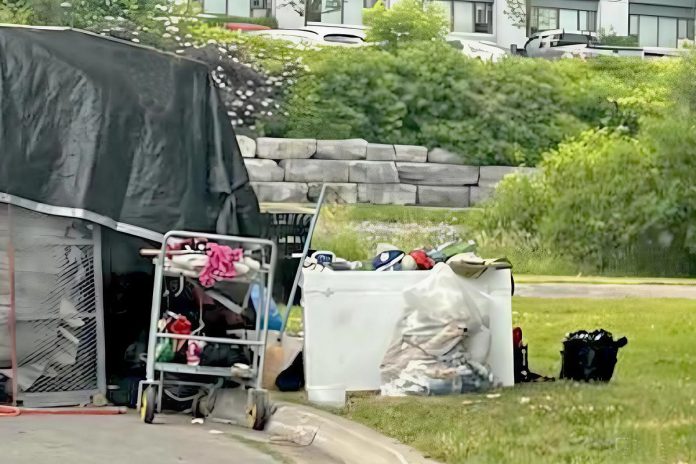City of Kawartha Lakes staff have presented a committee of council with an update and proposed policy around encampments and homelessness in the municipality.
Kawartha Lakes’ committee of the whole heard from the city’s chief administrative officer Ron Taylor, director of human services Cheryl Faber, and human services manager Michelle Corley on the issue during its meeting on Tuesday (April 8).
The trio provided an update to the city’s encampment response work in 2024, and recommended a policy for council to consider that provides a “guiding framework” for the future.
As recommended, their presentation and the policy — entitled the encampment response policy and intended to be part of the city’s policy manual if passed — will come before council to consider at its next regular meeting in two weeks.
“Approaching this issue with empathy, effective communication, and a commitment to long-term housing solutions over time is key to finding an equitable and sustainable resolution,” stated Corley in her report.
She provided some context to highlight the need for an encampment response policy.
“Municipalities in Ontario face a delicate balance when it comes to managing encampments on public land. On one hand, they must ensure the human rights and dignity of individuals experiencing homelessness, providing them with access to basic needs such as shelter, food, and safety. On the other hand, municipalities are tasked with maintaining safe, clean, and welcoming public spaces for all residents, which may be challenged by the presence of encampments.”
She said municipalities must navigate “complex legal and ethical considerations,” ensuring that their actions comply with human rights obligations while addressing concerns from the broader community about public health, safety, and aesthetics.
“This balancing act requires careful integration and co-ordination of resources, policies, and services that prioritize both the well-being of individuals in encampments and the needs of the general public.”
At the City of Kawartha Lakes committee of the whole meeting last September, staff introduced concepts aimed at supporting the creation of an encampment response protocol. At Tuesday’s meeting, staff recommended council approve their proposed policy to help shape the city’s future response to encampments.
“Since the committee of the whole meeting on September 10, staff implemented many of the guiding principles outlined in the draft council policy to manage encampments,” Corley noted. “Over the past few months, this process has provided opportunities to foster collaborative relationships among city staff across various departments, gain valuable insights, and build trust with individuals experiencing homelessness.”
“Additionally, staff have gained a better understanding of the impacts that encampments have on those staying in them, as well as on staff, municipal services, and nearby residents. Through this experience, staff have also updated operational processes.”
The encampment protocol process begins when the city becomes aware of a new encampment, engaging in supports while actively assessing and monitoring encampments. The goal of the encampment response is to clear the encampment by ideally finding the individuals in the encampment appropriate shelter or housing option that meets their unique needs. The process can include phases involving compliance and in serious circumstances enforcement and eviction of those in the encampment, the city noted.
Councillors heard that the encampment outreach and response protocol does not require any specific financial commitments, beyond what is already included within the 2025 operating budget.
Staff said that, as of February 4, there were 89 people known to be experiencing homelessness in Kawartha Lakes and 38 in Haliburton County. Of that number, 14 single people are estimated to be experiencing unsheltered homelessness, with their experiences of unsheltered homelessness being more temporary or transient during the winter.
Through its outreach work, city staff also reported that 16 households secured permanent, secure, and safe rental units or rent-geared-to-income units, that one household who had been chronically outdoors for several years secured a place in a transitional housing program and has been stable and successful for three months, and that several households gained access to emergency shelter and remain connected to many resources.
On its website, Kawartha Lakes states it embraces “a human rights approach to homelessness” and that all people in the community, including people living in encampments, “will be treated with dignity and respect and be actively involved in the decisions that directly affect them.”
“The city does not want to see citizens live outdoors. Our goal is to move people indoors to safe housing while respecting the rights and dignity of those living outdoors with no other options.”
As part of its coordinated response, the city notes it has developed and adopted “fair guidelines” that will allow encampments of limited sizes on public property.
“Sites are supported by trained homelessness outreach workers who provide referrals and develop housing plans and goals with those living in encampments. The response will provide consistency and structure for those who are unhoused by creating limitations and expectations for encampments.”
“Our hope is that the city’s encampment response will be short-term until more housing is built. We believe our community is unified and committed to ending homelessness and ensuring that every resident’s human rights are respected, and each person is treated with dignity.”


























